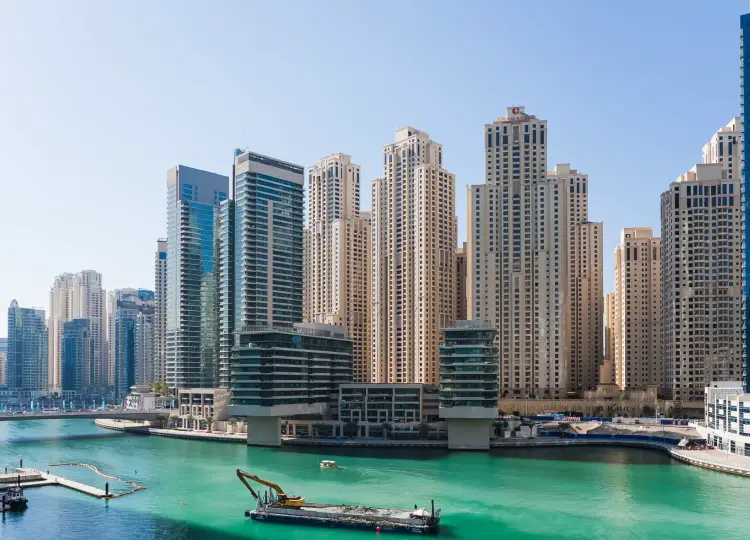Image by ArthurHidden on Freepik
Dubai, the glittering jewel of the United Arab Emirates, has long been synonymous with architectural marvels, opulent lifestyles, and a booming real estate sector. Its skyline, studded with iconic skyscrapers and man-made islands, tells the story of a city that has defied geographical limitations and turned a desert into a global real estate powerhouse. In this article, we will delve into Dubai's real estate business, its remarkable evolution, key trends, and the factors that continue to drive its growth.
The Dubai Dream: A Global Real Estate Hub
Dubai's meteoric rise as a global real estate hub is a testament to the vision of its leaders and its unwavering commitment to transformation and innovation. This journey began in the late 20th century when the emirate started diversifying its economy away from oil and toward sectors like tourism, trade, and real estate.
Key Milestones:
-
Palm Islands: One of the first mega-projects that captured the world's imagination was the creation of Palm Jumeirah, a man-made island shaped like a palm tree. This was followed by Palm Jebel Ali and Palm Deira, forming a trio of remarkable engineering feats.
-
Burj Al Arab: The iconic Burj Al Arab, often called the world's only 7-star hotel, became a symbol of luxury and extravagance when it opened in 1999.
-
Burj Khalifa: The crowning jewel of Dubai's real estate achievements, the Burj Khalifa, is the world's tallest skyscraper. Standing at 828 meters (2,717 feet), it redefined architectural possibilities and set new standards for super-tall buildings.
-
Dubai Marina: The development of the Dubai Marina, an artificial canal city with a stunning skyline, brought a new dimension to waterfront living.
-
Business Bay: Business Bay emerged as a central business district with modern skyscrapers and a thriving commercial ecosystem.
The Economic Driver
Dubai's real estate sector has been a key driver of economic growth, contributing significantly to the emirate's GDP. The Dubai government strategically leveraged its geographical location, investor-friendly policies, and infrastructure development to attract foreign investment and establish itself as a global business and tourism hub.
Factors Fueling the Growth:
-
Tax Benefits: Dubai's tax-free environment and business-friendly regulations have made it an attractive destination for investors and expatriates.
-
Stable Economy: The emirate's political stability and prudent economic policies have instilled confidence in investors, both domestic and international.
-
Tourism and Hospitality: Dubai's thriving tourism industry has boosted demand for real estate, including hotels, resorts, and vacation homes.
-
Expo 2020: The hosting of Expo 2020 further accelerated infrastructure development and tourism, creating a ripple effect in the real estate sector.
-
Global Connectivity: Dubai's world-class airports, including Dubai International and Al Maktoum International, have made it a global transportation hub.
The Evolving Landscape
Dubai's real estate landscape has undergone significant changes over the years, adapting to the shifting demands of investors, residents, and businesses. Here are some key trends that have shaped the sector:
1. Diversification of Offerings
Dubai's real estate market has diversified beyond luxury properties. While high-end developments continue to attract attention, there is a growing focus on affordable housing, mid-range properties, and co-living spaces to accommodate a diverse population.
2. Sustainability and Green Building
In recent years, there has been a strong emphasis on sustainability and eco-friendly building practices. Developers are incorporating green technologies and designs to reduce energy consumption and environmental impact.
3. Real Estate Technology (PropTech)
Dubai has embraced real estate technology to enhance customer experiences and streamline processes. PropTech innovations, such as virtual property tours and blockchain-based transactions, have gained traction.
4. Regulations and Investor Protection
To foster confidence among investors, Dubai has introduced various regulations and initiatives to protect their interests. These include escrow accounts, clear property ownership laws, and rental regulations.
5. Co-Working Spaces
The rise of co-working spaces reflects Dubai's evolving business landscape. These flexible workspaces cater to startups, entrepreneurs, and remote workers, promoting innovation and collaboration.
6. Affordable Housing Initiatives
Dubai's government has launched initiatives to make homeownership more accessible. Programs like "Rent-to-Own" and affordable housing projects aim to address housing affordability challenges.
7. Integration of Smart Technology
Dubai's ambition to become a smart city extends to its real estate. Smart home technologies and integrated city management systems are becoming standard features in new developments.
Challenges and Opportunities
While Dubai's real estate sector has achieved remarkable success, it also faces challenges and opportunities:
Challenges:
-
Economic Uncertainty: Global economic fluctuations can impact investor sentiment and real estate demand.
-
Oversupply: At times, Dubai has faced oversupply issues, leading to a dip in property prices. Striking a balance between supply and demand is crucial.
-
Regulatory Changes: Frequent regulatory changes can create uncertainty for investors and developers.
Opportunities:
-
Sustainable Development: Dubai can further enhance its reputation as a sustainable city by investing in renewable energy and sustainable urban planning.
-
Technology Integration: Continued integration of technology can make Dubai's real estate sector more efficient and appealing to a tech-savvy global audience.
-
Affordable Housing: Addressing affordable housing needs can broaden the real estate market's appeal and cater to a diverse population.
Conclusion
Dubai's real estate journey from a barren desert to a global hub of innovation and luxury is a testament to human ambition and vision. While it has faced challenges along the way, its adaptability and determination have allowed it to weather storms and emerge stronger. The Dubai dream of a sustainable, smart, and inclusive city continues to evolve, promising a future where real estate reflects the diverse needs and aspirations of its residents and investors.
As Dubai embraces sustainability, technology, and affordability, it stands at the cusp of a new era in its real estate sector—a chapter that promises to be as fascinating and transformative as the ones that preceded it. The city's commitment to innovation and progress ensures that the Dubai real estate story is far from over.


